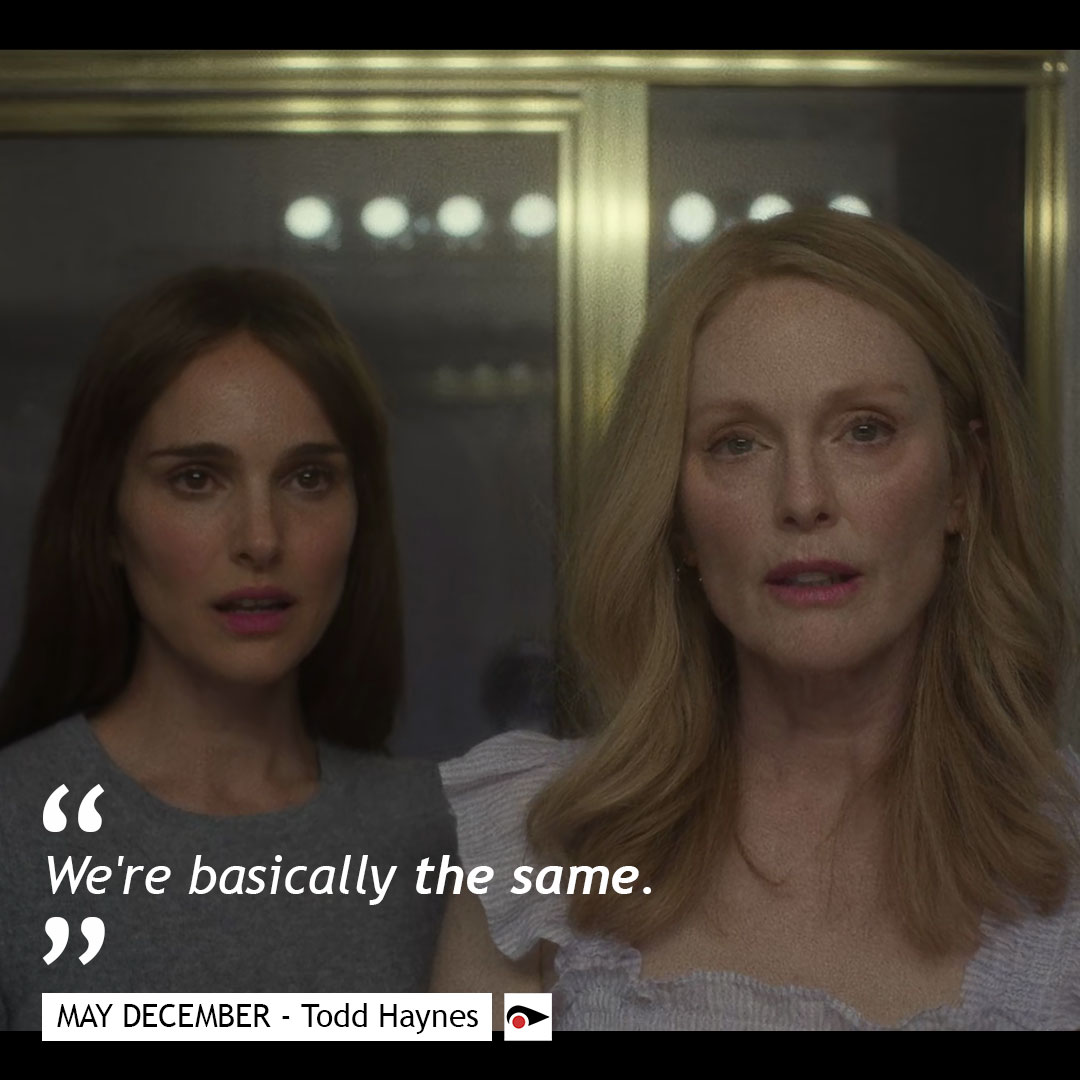
Todd Haynes – May December (2023)

ENGLISH VERSION | ITALIAN VERSION

Do we recommend watching it?
Absolutely yes!
A few words about the film.
Ambiguity, moral gray areas, and specular duplications define what could be Todd Haynes’s “Mulholland Drive,” obviously without the classic Lynchian distortions but with the usual narrative and visual composure of the great American director.
“May December” indeed presents a refined staging (also thanks to the excellent cinematography) that brings to the screen a drama unfolding entirely beneath its surface, characterized by a decidedly ambiguous subtext permeating every dialogue. From a writing perspective, it’s extremely intelligent, building an image of events and characters piece by piece, which, however, even in the end, though full, cannot be considered complete or whole. Ultimately, Elizabeth (Natalie Portman), until the last frame, seeks a “truth” that seems within reach, yet remains elusive (and perhaps, the film suggests, not entirely graspable).
All family relationships are distorted by the age difference, yet Haynes’s eye never loses its aesthetic grace or balance, avoiding overtly judgmental approaches. The two female protagonists, with a vampiric quality, are mirrored (a theme almost declared yet hidden in the screenplay, when, upon Elizabeth’s arrival at the party, Gracie (Julianne Moore) says, “I thought you were taller. You look taller on television, but we’re basically the same size,” and the actress responds, “We’re basically the same”). Both Elizabeth and Gracie play on the plane of sensuality, as in the mirror and makeup scene. Elizabeth feeds off Gracie’s actions, imitating her movements and speech, increasingly creating a disturbing effect. But, once again, imitation alone fails to fully convey the complexity of the situation.
The film takes viewers into a world of subtle and intricate manipulations. Joe’s trauma, accentuated not only by the age difference but also by surrounding societal judgment, crystallizes him around that age. The actress, eager to establish a “connection,” reactivates Joe’s past dynamics, attracting and seducing him. Despite Joe’s initial resistance, in the end, Elizabeth gets what she wants by lying about her inability to use a new inhaler for asthma, a detail Joe remembers from his childhood when he cared for his asthmatic sister (thus bringing Joe back to that age). This lie, fueled by Gracie (who recounts Joe taking care of her sister), grants Elizabeth success in her manipulation, superficially aimed at seduction and “connection,” but in reality, merely a way to exchange positions with Gracie herself.
Paradoxically, even though Joe doesn’t seem entirely at the mercy of Elizabeth’s manipulation, accepting her initial lie about inhalers (or is he really naive as Gracie, instead, pretends to be?), his relationship with his younger sister which appears pure is the reverse shot of the familial horror dynamic that Georgie, the excluded son, suggests to the actress as a possible childhood trauma suffered by her mother Gracie, explaining her subsequent behaviors. However, doubts arise that this story from Georgie was told with Gracie’s complicity.
In a film based on a taboo and narrated by the protagonists as an incomprehensible love story to outsiders (is it a coincidence that one of the couple’s daughters is named Honor?), the subject seems to transform the film into a nightmare of butterflies trapped in their chrysalis, unable to emerge, victims of mechanisms larger than themselves. “May December” seems to suggest that no one is fully guilty (or wants to feel so), but everyone has responsibilities and that the irreducible complexity of human affairs cannot be synthesized into a binary position. And while it never fully focuses on the concept of perpetrator, that of victim seems to have clearer outlines, even if, thematically, the dichotomous concept that follows is nuanced and elusive.
The most intriguing aspect of the film lies in the fact that, paradoxically, even in the absence of the various character elements that are masterfully told throughout the story, it seems that we know more about the characters at the beginning – when we still know absolutely nothing about the story – rather than at the end, eroding preconceptions and stereotypes that we may have brought with us to the theater, in a journey that questions our own perceptions and beliefs.
“Where can I watch it?”
The film is available, at the time of writing, on Netflix, but since the streaming landscape is constantly changing, we encourage you to take a look at this JUSTWATCH link, which will tell you where to find it.
“Should I watch it, then?”
Well, you now know what we think about it but if you haven’t watched it are still unsure whether to do it, take a look at the trailer.
Now, nothing left to do here, you just have to go and watch it or if you already did and have something to say about this movie, feel free to leave a comment at the end of the page and say whatever you like about the film. On this site, we are always happy to host others’ opinions on cinema and why not, open a debate if you don’t agree with us on this.
Something else?
To read more of these film “pills”, please visit our dedicated section. Or, if you’re after a more-in-depth look at some films and/or filmmaking techniques more than just a few words, please have a look at our Film Analysis page.
By clicking here, instead, you will find our profile on LETTERBOXD.